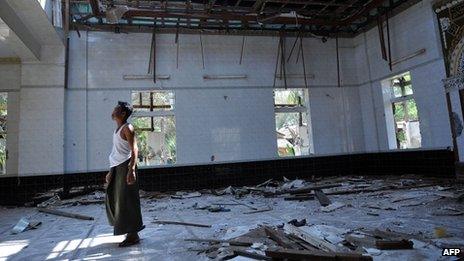Burma's President Thein Sein warns 'extremists'
- Published

Mosques and houses belonging to Muslims have been destroyed in the violence
The Burmese government will use force if necessary to stop "political opportunists and religious extremists" from fomenting hatred between faiths, President Thein Sein has warned.
It was his first public comment on the violence, which began last week.
At least 40 people have been killed as a result of discord between Buddhists and Muslims since 20 March.
Curfews have been imposed in a number of areas, as crowds of Buddhists attacked Muslim buildings.
The police were reported on Wednesday to have opened fire in one town on a crowd of about 500 people.
Last Friday a state of emergency was enforced in the central town of Meiktila in Mandalay region - where the communal violence began after a reported argument at a gold shop.
'Last resort'
"I would like to warn all political opportunists and religious extremists who try to exploit the noble teachings of these religions and have tried to plant hatred among people of different faiths for their own self-interest. Their efforts will not be tolerated," the president said in a national televised address.
"In general, I do not endorse the use of force to solve problems. However, I will not hesitate to use force as a last resort to protect the lives and safeguard the property of the general public," he said.
"All perpetrators of violence will be prosecuted to the fullest extent of the law."
The president said that "conflicts and difficulties" would inevitably arise during Burma's transition to a democracy.
He called on police to "perform their duties decisively, bravely and within the constraints of the constitution and by-laws".
Correspondents say that police in Meiktila have been criticised for failing to act quickly enough to stop the rioting, in which houses, shops and mosques were burned down.
At least 12,000 Muslims are thought to have fled their homes because of the unrest.
In similar violence in Rakhine state last year, nearly 200 people were killed and tens of thousands forced from their homes.
The conflict that erupted in Rakhine involved Buddhists and Rohingya Muslims, who are not recognised as Burmese citizens and have complained of frequent persecution.
Those affected by the latest violence insist that in contrast to the allegations made against the Rohingyas they are legitimate Burmese citizens.
Correspondents say that isolated violence involving Burma's majority Buddhist population and its minority Muslim community has occurred for decades, even under military governments that ruled the country from 1962 to 2011.